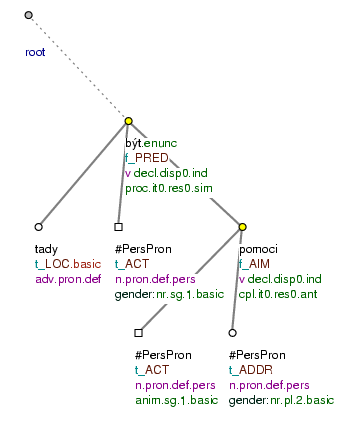NB! A special group is set aside from the big group of purpose/aim modifications, a group assigned the INTT functor (see Section 5.5, "INTT").
Modifications with the AIM functor refer to an event or state someone wants to achieve and the achievement of which depends on the achievement of the event expressed by the governing word. From this it follows that this in principle concerns a relation between two events and the AIM modification is primarily expressed by a dependent clause (most often with the conjunction aby (=in_order_to) ). However, in some cases, the AIM modification can also be expressed by a prepositional phrase.
The definition of the AIM functor also implies that modifications with the AIM functor primarily modify verbs (and their nominalized forms). However, AIM modifications can also express the purpose an object is made for, or the purpose of a phenomenon. In such cases the modification with the AIM functor can modify a non-derived noun, e.g. kapky na trávení (=lit. drops for digestion) ; voda k pití (=water to drink); kniha pro radost (=lit. (a) book for joy).
Forms. The basic forms AIM modifications are:
-
dependent clause.
The most common forms:
aby Měl by mít v evidenci takový pořádek, aby se dalo kdykoli zjistit, zda u něho někdo pracuje načerno. (=He should keep his records well-organized to show whether he employs any persons without a work permit.) proto - aby Každý přece dělá vše proto, aby se dostal vzhůru. (=Everybody does everything possible to get higher.) Example:
Jsem tu pro to, abych vám pomohl.
AIM(=lit. (I) am here for that to you help.) Fig. 7.24 -
prepositional phrase.
The most common forms:
k+3 Domek byl zastaven už dříve ke krytí půjčky (=The house was pawned earlier to cover the loan.) do+2 Nebytové prostory nabízí město do pronájmu (=The city offers to rent the non-residential premises.) na+4 Banky zpravidla na úhradu dluhů nepůjčují. (=Banks usually do not loan money for debt repayment.) o+4 kvalifikační turnaj o postup ze skupiny B (=a group B qualifiers tournament) od+2 Od toho jsou jiní. (=There are others for that.) pro+4 Pro povolení prodeje těchto potravin se musí vždy vést samostatné řízení. (=To permit the sale of this food individual proceedings must always be held.) pro případ+2 Šetří síly pro případ potřeby. (=He is saving energy for case of need.) v zájmu+2 V zájmu zkvalitnění legislativního procesu by měl každý zákon projít oběma komorami. (=In the interest of making legislative process more efficient each bill is supposed to be passed by both chambers.) za+4 hnutí důchodců za životní jistoty (=the of old age pensioners to promote life security) za účelem+2 Pracoval jen za účelem výdělku. (=He worked only to make money.)
The AIM functor can also be used for the governing verbs of so-called false purpose clauses (for details see Section 5.4.2, "False dependent conjunctional clauses").
Figure 7.24. The AIM functor

Jsem tu pro to, abych vám pomohl. (=lit. (I) am here for that to you help.)
Border with the INTT functor. Modifications with the AIM functor are very close to modifications with the INTT functor (see Section 5.5, "INTT"). For more details see Section 5.5.1, "Borderline cases with the INTT functor ".
Border with the BEN functor. As far as the semantics and form are concerned, modifications with the AIM functor are close to modifications with the BEN functor (see Section 9.1, "BEN"). The intended goal, the result of the event can be of benefit for a person or an institution. However, it is possible to express both the person or institution who benefits from the event, and the purpose of the event, e.g.:
Vždy pracoval pro firmu.BEN , aby nebyl propuštěn.AIM (=lit. (He) always was_working for (the) firm to not_be dismissed.)
In those cases in which the meaning of "someone's benefit " is present, the BEN functor is to be preferred. Cf.:
-
Vzdal se svých zálib ve prospěch svých dětí.
BEN(=lit. (He) gave_up - his hobbies in favour (of) his children.)The modification ve prospěch svých dětí (=lit. in favour (of) his children) is assigned the
BENfunctor.
Border with the ACMP functor. Modifications with the AIM functor can border on ACMP modifications (see Section 6.1, "ACMP"). For details see Section 6.1.1, "Borderline cases with the ACMP functor".